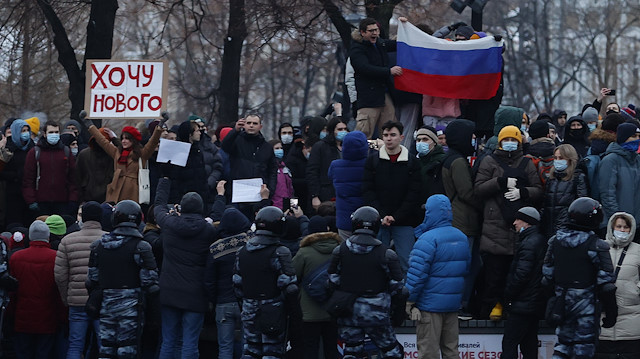
Thousands in Russia took to streets on Saturday to protest detention of opposition politician Alexey Navalny
The EU and European countries on Saturday raised their concern over the detention of people in Russia protesting the arrest of Russian opposition politician Alexey Navalny.
Tens of thousands of people on Saturday gathered in Russia to protest Navalny’s detention, demanding his immediate release.
Many people supporting Navalny were detained in the country while police intervened the protestors harshly.
“Following unfolding events in #Russia with concern. I deplore widespread detentions, disproportionate use of force, cutting down internet and phone connections,” Josep Borrell, the EU foreign policy chief, said on Twitter.
Borrell said the EU foreign ministers will discuss “next steps” on the issue at the Foreign Affairs Council on Monday.
UK’s Foreign, Commonwealth and Development Office also raised concern over “the detention of peaceful protesters and continue to monitor the situation closely.”
“We urge the Russian government to respect and comply with its international commitments on human rights, and release citizens detained during peaceful demonstrations,” the statement said.
Navalny’s wife Yulia Navalnaya was also held by the police on Saturday protests, she posted on Instagram.
Navalnaya posted a photo of herself with the caption “Sorry for the poor quality. Very bad light in the police van."
Kremlin spokesman Dmitry Peskov said Friday that attempts to organize unauthorized rallies and incite young people to participate in them is “unacceptable”.
“The only appropriate stance is in favor of abiding by the law and against the organization of unauthorized activities, let alone attempts to incite young people and children to take part in them," he told reporters.
- Navalny video breaks record
Navalny and his team posted a video on YouTube claiming Russian President Vladimir Putin built a palace on the Black Sea coast for $1.4 billion with the “bribes he got.”
The video, which claimed the palace is “the most expensive in the world", has been watched for more than 71.60 million times.
Peskov, criticizing the allegations on Friday, said: "Putin does not have such a palace. He does not have any palace."
Navalny, 44, who received treatment in Germany after alleged poisoning, was arrested in the Russian capital Moscow upon his return Sunday evening. Russian authorities said he had violated probation terms from a suspended sentence on a 2014 money-laundering conviction, which Navalny says is "politically motivated".
Less than 25 hours after his return, Moscow’s Khimki Court ruled that he will remain in custody on a 30-day pre-trial detention.
Navalny is now behind bars in Moscow’s infamous jail Matrosskaya Tishina.
In an Instagram post he wrote through his lawyers on Wednesday, Navalny said: “I’d read about it [the prison] in books and now I’m here. Russian life.”
The prominent opposition figure fell sick last August on a flight to Moscow. After an emergency landing in the Siberian city of Omsk, he spent two days in a Russian hospital before being sent to Berlin for treatment.
After tests in several labs, German officials said Navalny was poisoned with the nerve agent Novichok, which was also used according to the UK government in a 2018 attack on former Russian spy Sergei Skripal and his daughter in the British town of Salisbury.
Russian authorities deny any involvement in the case and contend that chemical weapons have neither been developed nor produced by Russia since the last chemical round was destroyed in 2017.


